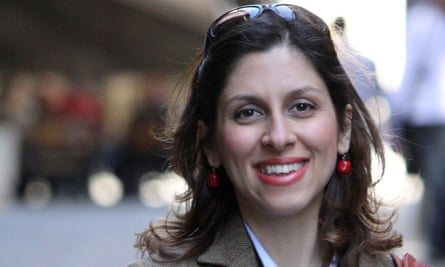Nazanin Zaghari-Ratcliffe faces new charge, Iranian media reports
State TV says British-Iranian dual national appeared in Tehran court on Tuesday

The British-Iranian dual national Nazanin Zaghari-Ratcliffe faces a new, unspecified charge, according to a report on Iranian state TV, which also said she had appeared in court on Tuesday morning.
The report did not elaborate beyond saying Zaghari-Ratcliffe has appeared before a branch of the country’s revolutionary court in Tehran, where she was first sentenced in 2017.
Labour MP Tulip Siddiq said she had spoken to Zaghari-Ratcliffe who confirmed she was taken to court on Tuesday morning and told she was facing another trial on Sunday.
I've been in touch with Nazanin Zaghari-Ratcliffe and can confirm that she was taken to court this morning and told she will face another trial on Sunday.
— Tulip Siddiq (@TulipSiddiq) September 8, 2020
I know many people are concerned about her welfare and I'll keep everyone updated when we have more information #FreeNazanin
Zaghari-Ratcliffe has been under effective house arrest following her release from prison due to the coronavirus pandemic after serving nearly all of her five-year sentence. She has been wearing an ankle tag that limits her movements to within 300 metres (984ft) of her parents’ home in Tehran.
Zaghari-Ratcliffe was arrested during a holiday with her daughter in April 2016. Her family says she was in Iran to visit family, denying she was plotting against the state. She was accused of plotting the “soft toppling” of Iran’s government.
Zaghari-Ratcliffe worked for the Thomson Reuters Foundation, the charitable arm of the news agency.
The new charge comes after Zaghari-Ratcliffe’s family linked her detention to Iran’s negotiations with the British government over a £400m settlement ($530m) held by London, a payment the late Iranian Shah Mohammad Reza Pahlavi made for Chieftain tanks that were never delivered.
Tehran has denied her detention was linked to the negotiations. The charges could be an attempt to gain new leverage in the negotiations.
Iran was hit hard by the coronavirus early this year, becoming the worst-affected country in the Middle East. Since then, it has reported more than 391,000 cases and 22,542 deaths.
Timeline
Nazanin Zaghari-Ratcliffe is arrested at Imam Khomeini airport as she is trying to return to Britain after a holiday visiting family with her daughter, Gabriella.
Her husband, Richard Radcliffe, delivers a letter to David Cameron in 10 Downing Street, demanding the government do more for her release.
She is sentenced to five years in jail. Her husband says the exact charges are still being kept a secret.
Nazanin Zaghari-Ratcliffe's health deteriorates after she spends several days on hunger strike in protest at her imprisonment.
Iran’s supreme court upholds her conviction.
Boris Johnson, then Foreign Secretary, tells a parliamentary select committee "When we look at what [she] was doing, she was simply teaching people journalism". Four days after his comments, Zaghari-Ratcliffe is returned to court, where his statement is cited in evidence against her. Her employers, the Thomson Reuters Foundation, deny that she has ever trained journalists, and her family maintain she was in Iran on holiday. Johnson is eventually forced to apologise for the "distress and anguish" his comments cause the family.
Her husband reveals that Zaghari-Ratcliffe has fears for her health after lumps had been found in her breasts that required an ultrasound scan, and that she was now “on the verge of a nervous breakdown”.
New Foreign Secretary Jeremy Hunt meets with Richard Ratcliffe, and pledges "We will do everything we can to bring her home."
She is granted a temporary three-day release from prison.
Zaghari-Ratcliffe is on hunger strike again, in protest at the withdrawal of her medical care.
The foreign secretary, Jeremy Hunt, takes the unusual step of granting her diplomatic protection – a move that raises her case from a consular matter to the level of a dispute between the two states.
The UK upgrades its travel advice to British-Iranian dual nationals, for the first time advising against all travel to Iran. The advice also urges Iranian nationals living in the UK to exercise caution if they decide to travel to Iran.
Richard Ratcliffe joins his wife in a new hunger strike campaign. He fasts outside the Iranian embassy in London as she begins a third hunger strike protest in prison.
Zaghari-Ratcliffe ends her hunger strike by eating some breakfast. Her husband also ends his strike outside the embassy.
According to her husband, Zaghari-Ratcliffe was moved from Evin prison to the mental ward of Imam Khomeini hospital, where Iran’s Revolutionary Guards have prevented relatives from contacting her.
Zaghari-Ratcliffe's five year old daughter Gabriella, who has lived with her grandparents in Tehran and regularly visited her mother in jail over the last three years, returns to London in order to start school.














